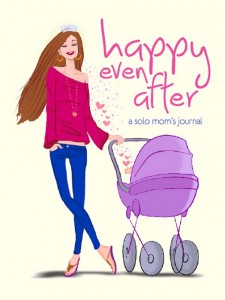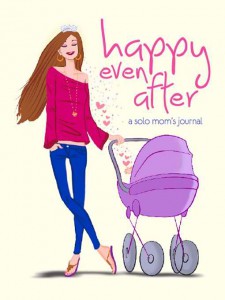By ELIZABETH LOLARGA
 DIARIES, journals and planners are staples of bookstores and boutiques at the end of the year. For the first time there’s one that addresses a single mother’s needs.
DIARIES, journals and planners are staples of bookstores and boutiques at the end of the year. For the first time there’s one that addresses a single mother’s needs.
The era of banishing a woman with child out of wedlock from the family home or wrenching the baby out of an unwed mother’s arms to give it up for adoption and save the family’s honor is gone.
In a predominantly Roman Catholic country, Ana P. Santos, freelance journalist and former corporate banker, breaks new ground with Happy Even After: A Solo Mom’s Journal (printed by Viviamo Inc.; published by www.happyevenafter.com) that, takes the stigma and shame out of being a single mom.
Apart from blank pages that the journal keeper can use to write down her thoughts, Happy Even After features short, helpful essays from other single mothers like prominent widow Risa Hontiveros, who’s a lawmaker and women’s rights activist, former beauty queens Marina Benipayo and Patty Betita, television host Angel Jacob and journalist Miriam Grace Go, expert advice from psychologist Margarita Holmes on how to help children adjust to a situation of separation or an absent father, the full text of Republic Act No. 8972 or the Solo Parents’ Welfare Act of 2000 that specifies the benefits a solo parent is entitled to.
Santos ensures that a lot of ground is covered despite the journal’s slim size. Two children raised by single mothers, Looie Lobregat-Ocampo and Mary Ann Marchadesch, wrote testimonies on how they emerged whole and happy despite their non-traditional families.
Santos got the idea for this project at a seminar on professional blogging and internet marketing where participants thought of Web-based endeavors that they wanted to do.
She says: “Since becoming a solo mom, I’ve been starving for local resources on the topic. Foreign books are not applicable because there is no divorce here and they don’t deal with the nuances of Filipino culture and society like social taboos and how closely knit we are. There is the stigma that makes it look like solo moms are victims.”
She adds: “You can’t tell when you’ll become a solo mom or if you will become one. So the journal was a product of that need. I want solo moms to rise above their circumstances and make a life for themselves and their children.”
With figures from the National Statistics Office estimating that there are three million children of solo parent homes, defined as children of parents who are separated, widowed or coming from a family with one parent based overseas, the publication of a personalized journal that can enable and empower is timely.
Santos says: “I wanted something personal, something the reader can own. As solo moms, we are not the same. Some have been married or have never married. For the widows, the choice to separate from their partner was not theirs. Whatever the reason, we need to know how to pull ourselves together, move on, remain optimistic because our children depend on us.”
Hontiveros recalls how, as a new widow with four children to raise, the simple advice of “Just keep on breathing” helped her get from one day to the next. Go shares she overheard her son pray, “Dear God, You’re the coolest guy in the world. Even if we don’t have a daddy, You’re our Father.”
Santos relates: “If I felt sorry for myself, it gave other people the license to feel that way about me. I learned that if you want to play the victim, you will be one. If you want to play your own heroine, you will be one, too.”
She felt the full weight of being a solo mom when her daughter would go through developmental milestones like taking her first steps and she had no one to share it, except the yaya (nanny). What she did was to blog about those memories so she could look back on them.
She adds: “That was part of the inspiration for making Happy Even After a journal—the need to put things down and re-live happy moments, the need to privately process thoughts and feelings, the impetus to write your own fairytale, a funky way of saying write your own happiness.”
Feedback from those who’ve bought the journal gratifies Santos.
She says: “It (the book) sends the message that it’s okay to be alone. I wrote that being alone is not the same as being on your own. When you find that you’re okay on your own, you can decide if you want another person to take part in your life. You don’t need to be rescued.”
